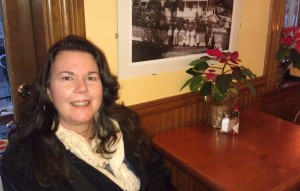
Cara Cohn finds new work finding jobs for disabled islanders.
Cara Cohn’s story is familiar on Orcas Island: she came here and was instantly attached to lving on the island. Like many others’ stories, it is also complex: undertaking whatever she can do to stay here, she has developed a career in helping others find employment and actively participate in the community.
She now works as an employment specialist with Washington Vocational Services, a private agency that contracts through the Washington State Department of Vocational Rehabilitation to provide adults with “supported” employment and “a way to connect with their community,” Cohn says.
She works with 15 clients on San Juan and Orcas Island, adults with disabilities whom she helps volunteer and work as paid staff in employment that they have a knack for. Cohn also works with employers and business owners to support her clients while they’re at work, and to crate accommodations where necessary.
She considers the big picture of a business and suggests ways her clients can fit into it so that the owners can “tweak and refine” their tasks so “they can carve out time to use their serious strengths.”
The jobs are all across the spectrum, based on her clients’ interests, abilities and aspirations. Clients work in schools, kitchens and nursing; one man who loves computers, reading, and words works as a community journalist; another young woman started filing and data entry at the Friday Harbor Laboratories, and is now participating in field research in a seagrass research project.
The Washington Vocation Services carries L&I insurance for the clients, and businesses often get a tax credit. Cara helps build the employer’s trust and the employee’s confidence in the work environment. Although her work is sometimes “obscure,” Cara says, “I work as cheerleader, coach and counselor; its often just a matter of the employer being willing to see [the clients’ ] strengths blossom.”
This position is a new field for Cohn, who previously worked as a Temple Cantor (singer) and educator. About six years ago, she and her husband Philip traveled to the Pacific coast to see the rain forests of the Olympic Peninsula. They got a tip to travel to Orcas Island, and Cara says, “I got off the ferry, took in a breath and felt, ‘There’s something going on here.’ I told my husband, ‘I’m gonna need to move here — I hope you do too’.”
Within a short time they sold their house in Florida and moved to Orcas, to fulfill his dream of opening a vegetarian restaurant — “Erbs.” Although ready for the business of running a restaurant, Cara says “We had no idea of the physical toll –it was exhausting.
“It was one of the most difficult things I’ve ever done. I stretched myself and learned different ways of ‘doing’ life. I learned so much about myself. I learned how to take care of myself when there weren’t enough hours in the day to do so. ”
The couple understood the “medicinal value of food” and the need to tailor one’s diet individually. But the economy and timing made it impossible to continue. Cara addressed the challenges by going back to the CD she and her husband had created about 10 years ago — “The Wish to Grow.” The CD is a new genre that combines guided imagery with sound healing made into a song. “As you listen you become the main character in the song,” says Cara.
And although the restaurant failed, she “takes serious pride in the fact that our relationship got stronger because of adversity.” Philip Cohn has a development job with the Jewish Federation of Greater Seattle.
And she loves her work. “It’s so rewarding everyday, waking up and experiencing how these folks negotiate the world. And I see so many benefits to opening yourself up to people of all kinds. There’s something inspiring that happens when people are willing to be vulnerable and let their walls down.”
**If you are reading theOrcasonian for free, thank your fellow islanders. If you would like to support theOrcasonian CLICK HERE to set your modestly-priced, voluntary subscription. Otherwise, no worries; we’re happy to share with you.**








There aren’t two harder working folks on the island than Phil and Cara. Great to read about Cara’s ‘new life.’ And they have a pretty darn cute beagle!